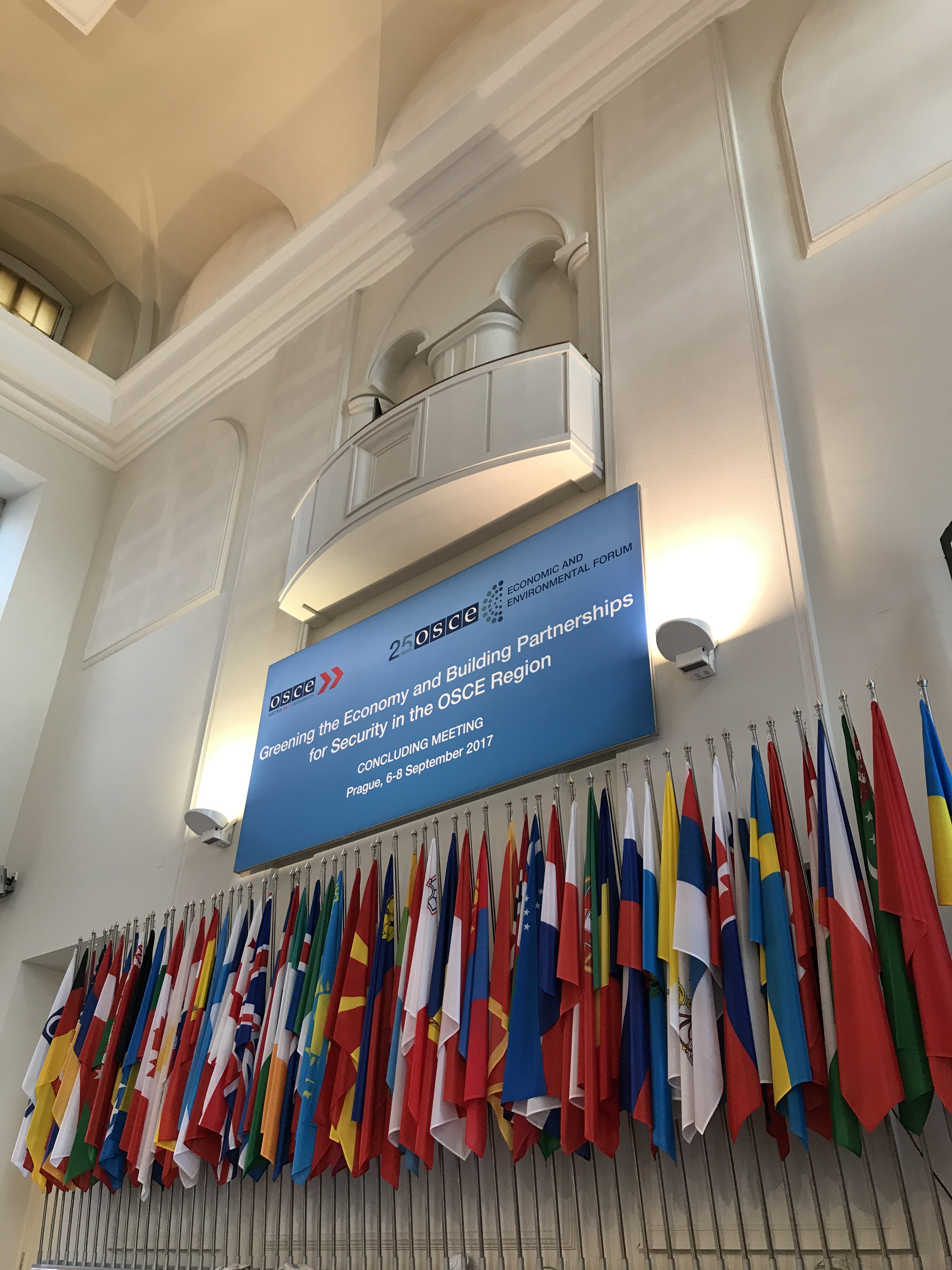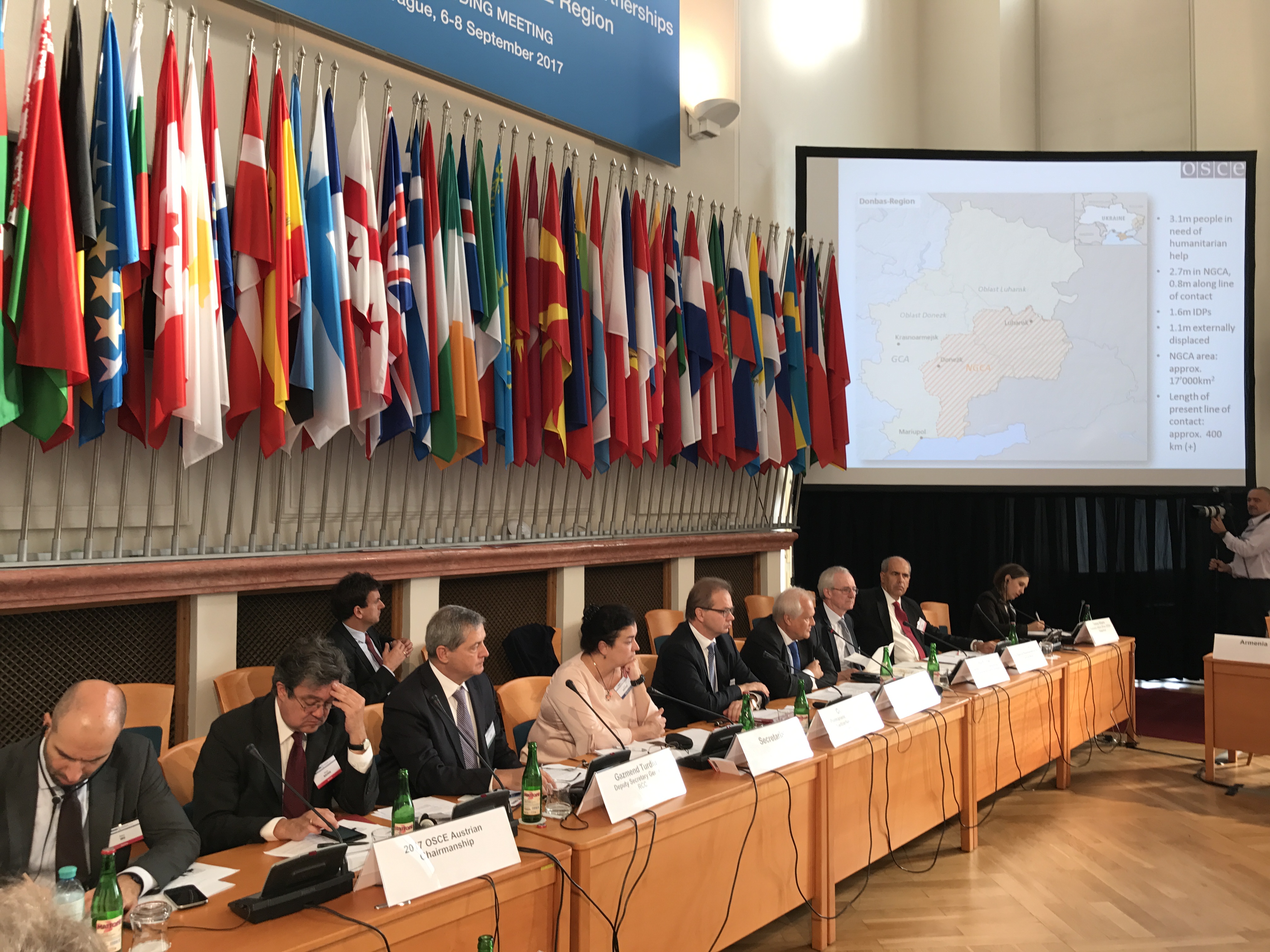By Paul Massaro,
Policy Advisor
From September 6 to September 8, 2017, the OSCE convened the 25th Concluding Meeting of the Economic and Environmental Forum. This annual conference brings together participating States for a wide-ranging discussion on policy as relates to the Second Dimension of the OSCE, or economic and environmental issues. The theme of the 2017 conference was “Greening the Economy and Building Partnerships for Security in the OSCE Region,” a topic selected by Austria, the current OSCE Chair-in-Office.
At a time when natural disasters like Hurricanes Harvey, Irma, and Maria are devastating U.S. communities, such a discussion could not be more relevant. Add to that the joblessness and low growth rates that continue to plague many parts of the region and you have a broad debate on the issues that most impact the everyday life of citizens of the OSCE region.
 The Forum took the form of a series of thematic panels featuring experts drawn from the UN, the NGO community, and academia, as well as from the relevant ministries of OSCE participating States.
The Forum took the form of a series of thematic panels featuring experts drawn from the UN, the NGO community, and academia, as well as from the relevant ministries of OSCE participating States.
Forum participants were particularly concerned with the effect that climate change is having on the frequency and magnitude of natural disasters, as illustrated by the extreme weather in the Caribbean and the United States. Much of the conference was devoted to discussing energy efficiency measures and renewable energy as a means to counteract the effects of burning fossil fuels on the environment. Experts agreed that energy efficiency and renewable energy are not separable concepts: the latter must be pursued to achieve the former.
Participants were also deeply concerned about youth unemployment, especially in relation to violent extremism. Many participating States struggle with unemployment or underemployment, which exacerbates the factors that lead youth to radicalize. Experts discussed countering violent extremism through more flexible labor market policies as well as addressing the exploitation of unemployment or underemployment by extremist recruiters.
Connectivity—transport, trade facilitation, and economic cooperation—was also discussed extensively. (Connectivity is distinct from economic integration, which envisions a deeper level of policy harmonization.) Experts and representatives from participating States generally agreed that two regions in particular could profit mightily from expanded connectivity: Southeastern Europe, or the Balkans region, where important steps toward greater connectivity are being made, and Central Asia, which remains among the regions with the lowest interregional trade in the world.
The economic and environmental situation in the Eastern Donbas was also an important part of the discussion. Experts expressed severe concern that the shelling in the industrial region could lead to ecological disaster should, for example, the chemical plants that dot the area be hit and their chemicals seep into drinking water. Participants also discussed how to reestablish connectivity in this region, which once was a cohesive economic sphere.
However, representatives from participating States argued that any discussion of regional connectivity would be for naught until Russia ceases its backing of militants in the region and enables a ceasefire to take effect.
Generally speaking, the mood of the conference was one of consensus. Despite disagreements on certain issues, participating States tend to be of one mind when it comes to the need to prevent and prepare for natural disasters, increase energy efficiency, and encourage job and business creation, all topics that made up the majority of the discussions at the 25th Concluding Meeting of the Economic and Environmental Forum. Although minor disagreements cropped up in all of these topics, they were ephemeral and did not lead to prolonged debate.
This general consensus may be a result of the fact that the arguably most controversial aspect of the OSCE’s Second Dimension, anti-corruption, was absent from all discussions. This is because this topic was addressed at the 2nd Preparatory Meeting of the 25th OSCE Economic & Environmental Forum in Astana and likely also because it was not a critical aspect of the theme of the Chair-in-Office. Nonetheless, at least a single panel on the topic would have been a welcome addition given its central importance to good governance. All in all, the Forum was a smooth and useful exercise that provided participating States with many worthwhile insights.
Paul Massaro attended the conference as a representative of the U.S. Helsinki Commission.






